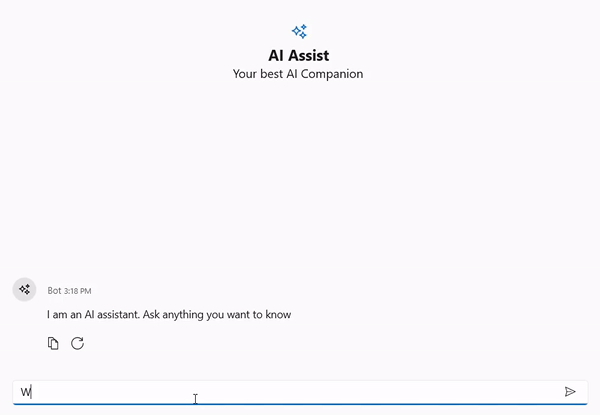How can I help you?
OpenAI connection for AI AssistView
27 Sep 202411 minutes to read
This section explains about how to connect the AI AssistView with OpenAI.
Creating an application with NuGet reference.
- Create a WinUI 3 desktop app for C# and .NET 6.
- Add reference to Microsoft Semantic NuGet NuGet.
Creating the OpenAI view model class.
To connect with OpenAI, we need the following details.
- OPENAI_KEY: A string variable where we should add our valid OpenAI API key.
- OPENAI_MODEL: A string variable representing the OpenAI language model we want to use.
- API_ENDPOINT: A string variable representing the URL endpoint of the OpenAI API.
<Page
x:Class="GettingStarted.MainPage"
xmlns="http://schemas.microsoft.com/winfx/2006/xaml/presentation"
xmlns:x="http://schemas.microsoft.com/winfx/2006/xaml"
xmlns:local="using:GettingStarted"
xmlns:d="http://schemas.microsoft.com/expression/blend/2008"
xmlns:mc="http://schemas.openxmlformats.org/markup-compatibility/2006"
xmlns:syncfusion="using:Syncfusion.UI.Xaml.Core"
mc:Ignorable="d"
Background="{ThemeResource ApplicationPageBackgroundThemeBrush}">
<Grid>
<syncfusion:SfAIAssistView CurrentUser="{Binding CurrentUser}"
Suggestions="{Binding Suggestion}"
ShowTypingIndicator="True"
TypingIndicator="{Binding TypingIndicator}"
Messages="{Binding Chats}"/>
</Grid>
</Page>public class ViewModel : INotifyPropertyChanged
{
AIAssistChatService service;
private ObservableCollection<object> chats;
public ObservableCollection<object> Chats
{
get
{
return this.chats;
}
set
{
this.chats = value;
RaisePropertyChanged("Messages");
}
}
public DataTemplate AIIcon { get; set; }
private ObservableCollection<string> suggestion;
public void RaisePropertyChanged(string propName)
{
if (PropertyChanged != null)
{
PropertyChanged(this, new PropertyChangedEventArgs(propName));
}
}
public event PropertyChangedEventHandler PropertyChanged;
private Author currentUser;
public Author CurrentUser
{
get
{
return this.currentUser;
}
set
{
this.currentUser = value;
RaisePropertyChanged("CurrentUser");
}
}
private bool showTypingIndicator;
public bool ShowTypingIndicator
{
get
{
return this.showTypingIndicator;
}
set
{
this.showTypingIndicator = value;
RaisePropertyChanged("ShowTypingIndicator");
}
}
public ObservableCollection<string> Suggestion
{
get
{
return this.suggestion;
}
set
{
this.suggestion = value;
RaisePropertyChanged("Suggestion");
}
}
private TypingIndicator typingIndicator;
public TypingIndicator TypingIndicator
{
get
{
return this.typingIndicator;
}
set
{
this.typingIndicator = value;
RaisePropertyChanged("TypingIndicator");
}
}
public ViewModel()
{
this.Chats = new ObservableCollection<object>();
this.Chats.CollectionChanged += Chats_CollectionChanged;
this.CurrentUser = new Author() { Name = "User" };
this.TypingIndicator = new TypingIndicator() { Author = new Author { ContentTemplate = AIIcon } };
service = new AIAssistChatService();
service.Initialize();
}
private async void Chats_CollectionChanged(object sender, System.Collections.Specialized.NotifyCollectionChangedEventArgs e)
{
var item = e.NewItems?[0] as ITextMessage;
if (item != null)
{
if (item.Author.Name == currentUser.Name)
{
ShowTypingIndicator = true;
await service.NonStreamingChat(item.Text);
Chats.Add(new TextMessage
{
Author = new Author { Name = "Bot", ContentTemplate = AIIcon },
DateTime = DateTime.Now,
Text = service.Response
});
ShowTypingIndicator = false;
}
}
}
public class AIAssistChatService
{
IChatCompletionService gpt;
Kernel kernel;
private string OPENAI_KEY = "";// Add a valid OpenAI key here.
private string OPENAI_MODEL = "gpt-4o-mini";
private string API_ENDPOINT = "https://openai.azure.com";
public string Response { get; set; }
public async Task Initialize()
{
var builder = Kernel.CreateBuilder().AddAzureOpenAIChatCompletion(
OPENAI_MODEL, API_ENDPOINT, OPENAI_KEY);
kernel = builder.Build();
gpt = kernel.GetRequiredService<IChatCompletionService>();
}
public async Task NonStreamingChat(string line)
{
Response = string.Empty;
var response = await gpt.GetChatMessageContentAsync(line);
Response = response.ToString();
}
}
}
NOTE